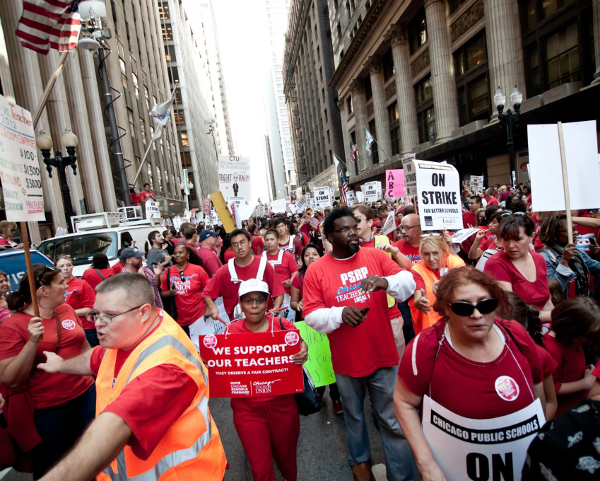
PHOTO/SARAH JANE RHEE
CHICAGO, IL — The $30 million dollar man, Mayor Rahm Emanuel, defeated Cook County Commissioner Jésus “Chuy” Garcia in the April 7 mayoral runoff election. Despite Emanuel’s huge war chest, his combined opposition forced him into a runoff when he won only 45% of the vote. Officially, 586,892 voters turned out for the runoff, just over 100,000 more than for the first round on February 24. Still, nearly 60% of registered voters stayed home.
This election was never about which individual was going to win. No matter who was the victor, each one would have been saddled with policies and laws intended to fatten and protect the wallets of the wealthy club that owns the resources of the Chicago area. This was always an election about what hold the Democratic Party still has on the workers, especially the impoverished and dispossessed section of workers.
In conceding, Garcia praised the promise of working-class unity that emerged from this campaign. Garcia stressed his origin in the Little Village working-class neighborhood, and that his fight was for working people in every neighborhood, against a machine that reserved all the resources for the wealthy in the downtown “Loop.” Emanuel will point to the fact that he won nearly all Black majority wards. The Emanuel forces were able to manipulate long-standing divisions within the working class to obtain the electoral victory. His message, to Black and white voters, was: “you cannot trust a Mexican-American with the finances of the city; Mexican-Americans are coming for your jobs.” Nevertheless, in many wards, a section of workers is beginning to coalesce and recognize its class interests in the common battle for survival.
The Chicago Teachers Union (CTU) spearheaded the challenge to Emanuel. CTU members, along with SEIU, Action Now and others, formed an independent political organization called United Working Families. Some within this formation have no patience with Democrats, while others are convinced that they can push the Democrats “to the left.” Emanuel’s promise to govern by listening, rather than by forcing his will, reflects more form than substance: the Democrats can only betray any promises they can make.
Now the battle shifts. Emanuel will face a strikingly different City Council. There, two Emmanuel opponents were already elected on February 24: David Moore (17th) and Carlos Ramirez-Rosa (35th). In the April runoff, they were joined by: challengers Gregory Mitchell (7th), Susan Sadlowski Garza of the CTU (10th), Toni Foulkes (16th) and incumbent John Arena (45th). Meanwhile, these pro-Emanuel incumbents were voted out: Lona Lane (18th), Deborah Graham (29th), Ray Suarez (31st) and Mary O’Connor (41st).
The times call on us to do more than fight for what we had. The destruction of public education and housing and the loss of jobs, especially to automation, ravaged Chicago. Jobless people can’t buy food, and robots don’t go shopping. Neither pay taxes. Something must give.
What is stopping the distribution of the abundant resources to the people is the private, corporate ownership of the socially produced product. The movement that emerges from this election must begin to map out how to provide for people according to need, not money.
